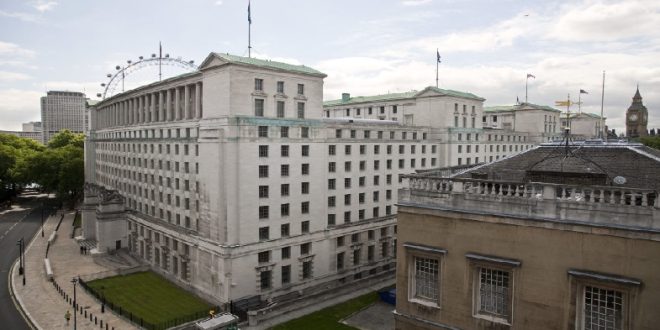08-05-2024
LONDON: Britain’s Ministry of Defence has been the target of a large-scale cyberattack, a government minister confirmed to British media.
On Tuesday, Work and Pensions Secretary Mel Stride told Sky News, which first reported the hack, that the attack was on a system run by an outside firm but was still a “very significant matter”.
 It targeted a third-party payroll system used by the Defence Ministry and included the names and bank details of current and former service personnel of the armed forces, Sky News and the BBC reported.
It targeted a third-party payroll system used by the Defence Ministry and included the names and bank details of current and former service personnel of the armed forces, Sky News and the BBC reported.
Defence Secretary Grant Shapps is expected to give further details to parliament later in the day.
“The MoD (Ministry of Defence) has acted very swiftly to take this database offline. It’s a third-party database and certainly not one run directly by the MoD,” Stride told Sky. The ministry first discovered the cyberattack several days back.
Tobias Ellwood, a former minister in the Conservative government, said the incident has the hallmarks of a Chinese cyberattack.
“Targeting the names of the payroll system and service personnel’s bank details, this does point to China because it can be as part of a plan, a strategy to see who might be coerced,” the former soldier and ex-chairman of a parliamentary defence committee told media.
Meanwhile, Stride said the government was not currently pointing the finger at Beijing. “That is an assumption…we are not saying that at this precise moment,” he added. Shapps is to confirm that a hostile state was the culprit, according to British media reports but the government is not expected to publicly name China.
China’s Ministry of Foreign Affairs spokesperson Lin Jian said Beijing opposed all forms of cyberattacks and rejected any attempt to use the issue of hacking for political ends to smear other countries.
“The remarks by relevant British politicians are utter nonsense,” Lin said on Tuesday. “China has always firmly opposed and cracked down on all types of cyberattacks.
 The two countries have increasingly sparred over the issue of hacking, with Britain saying in March that Chinese hackers and a Chinese entity were behind two high-profile attacks in recent years, the targeting of parliamentarians critical of China and an assault on the country’s electoral watchdog.
The two countries have increasingly sparred over the issue of hacking, with Britain saying in March that Chinese hackers and a Chinese entity were behind two high-profile attacks in recent years, the targeting of parliamentarians critical of China and an assault on the country’s electoral watchdog.
It has strained ties as Britain sought to strike a delicate balance between trying to neutralize security threats posed by China while maintaining or even enhancing engagement in some areas such as trade, investment and climate change but there has been growing anxiety about its alleged espionage activity in Britain, particularly before general elections expected later this year, and some British politicians have become increasingly vocal over the threat that they say China poses.
In last month, the United States and the United Kingdom have announced sanctions against a Chinese company and two individuals after an alleged cyber-espionage operation targeted millions of people, including legislators, voters and prominent Beijing critics. In announcing the sanctions on Monday, the US and UK traced the “malicious cyber activity” back to intelligence operations within the Chinese government. A statement from the US Treasury Department identified the sanctioned organization as Wuhan Xiaoruizhi Science and Technology Company Ltd. The announcement described it as a front company for the Chinese Ministry of State Security, serving as a “cover for multiple malicious cyber-operations”.
The US Treasury also named two Chinese nationals in its sanctions; Zhao Guangzong and Ni Gaobin, both of whom are affiliated with the Wuhan Company. They are accused of using cyberattacks to undermine critical infrastructure sectors including defence, aerospace and energy. (Int’l News Desk)
 Pressmediaofindia
Pressmediaofindia




